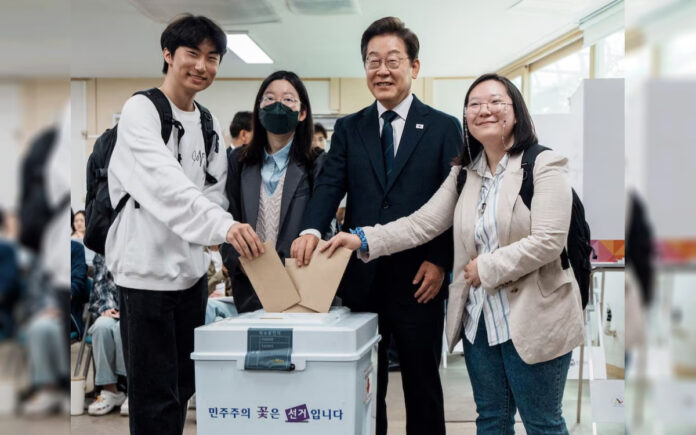Seoul: Liberal frontrunner Lee Jae-myung is poised to win South Korea’s snap presidential election next week, potentially ushering in a dramatic shift in the nation’s foreign policy. As a key U.S. ally in the Indo-Pacific, South Korea’s strategic stance on North Korea, China, Japan, and even nuclear policy could see notable recalibration under a new administration.
The vote follows the downfall of conservative former President Yoon Suk Yeol, who was impeached and removed from office after his controversial martial law decree in December. During his tenure, Yoon pursued closer ties with Washington, adopted a hardline posture on Pyongyang, and worked to mend historically strained relations with Tokyo.
Lee, who narrowly lost the 2022 election to Yoon, has historically expressed skepticism of the U.S.-South Korea alliance, while calling for greater engagement with North Korea and criticizing Yoon’s warming of relations with Japan. His earlier campaign remarks — suggesting South Korea should remain neutral in a potential China-Taiwan conflict — sparked backlash, prompting him to clarify that he is not aligned with Beijing.
In recent weeks, Lee has adopted a more centrist tone. He now emphasizes support for the U.S. alliance and expresses willingness to maintain trilateral cooperation with the U.S. and Japan — a partnership Washington considers vital in countering regional threats from China and North Korea.
“The Yoon administration claimed to uphold democratic values in foreign policy while pursuing authoritarian tactics domestically,” said Wi Sung-lac, a lawmaker advising Lee on foreign affairs.
“In contrast, if the Democratic Party wins, the incoming government will be prepared to genuinely defend democracy and lead a foreign policy grounded in those values, proven by its long history of struggle for democratic rights in Korea.”
Washington’s Wariness
Despite Lee’s shift, doubts persist in Washington. Analysts question whether his revised positions will hold, especially in dealings with U.S. President Donald Trump — known for pressing Seoul on trade, defense burden-sharing, and its ties with Beijing.
“Great scepticism remains that Lee would actually stray from his previous advocacy for conciliation with China and North Korea, nationalist antagonism toward Japan, and more independence in its alliance with the United States,” said Bruce Klingner, a former CIA analyst now at the Heritage Foundation.
Darcie Draudt-Vejares of the Carnegie Endowment for International Peace noted that Lee’s repositioning has broadened his support base, but also raised “concerns about future policy and governing consistency.”
The political landscape has significantly changed since Moon Jae-in, South Korea’s last liberal president, left office. His administration was marked by tense trade and diplomatic disputes with Japan and an ambitious but ultimately unsuccessful attempt to mediate U.S.-North Korea talks.
Also Read | IATA Summit in India to Address Growing Geopolitical Risks and Green Transition Struggles
A Western diplomat, speaking anonymously, suggested that new regional realities — including China’s assertiveness, U.S. policy unpredictability, and Pyongyang’s growing alignment with Russia — may force Lee to take a more pragmatic approach than his earlier positions might suggest.
Lee has committed to working with Japan on security, technology, and environmental matters, though he has criticized Yoon for offering too many concessions without reciprocal gains.
“While Lee may not actively walk back Yoon’s reconciliation with Japan… his party will react more strongly to any perceived slight from Japan over history issues,” Klingner said.
On nuclear policy, Lee has opposed calls by Yoon’s camp for redeploying U.S. tactical nuclear weapons or developing an indigenous arsenal — a stance that may calm regional tensions but raise concerns about deterrence in the face of North Korea’s growing threat.
Also Read | Gaza Ceasefire Offer: US Proposes 60-Day Halt in Fighting with Key Prisoner Swaps
Uncharted Terrain with Trump
In an interview with TIME, Lee praised Trump’s “outstanding skills” in negotiation and drew comparisons between their political journeys, highlighting their survival of assassination attempts and shared commitment to national interest.
“I believe the South Korea-U.S. alliance is the foundation of South Korea’s diplomacy,” Lee said during a debate, while also identifying U.S. protectionism as a challenge and pledging not to “unnecessarily” antagonize China or Russia.
Moon Chung-in, a former advisor to the previous liberal administration, described Lee as a strategic leader who may adopt a flexible approach with Trump. However, he cautioned that potential friction could arise.
“But if President Trump pushes too many demands, unlike other leaders in South Korea, Lee may not accommodate them all, which could be a source of friction,” Moon said.
North Korea: A Critical Test
One area of potential alignment between Lee and Trump lies in North Korea policy. Lee has pledged to reestablish communication channels and engage with Pyongyang in hopes of easing tensions.
Yet the ground realities have changed. North Korea now possesses a more advanced missile arsenal, has signed a broad security pact with Russia, and has officially declared reunification with the South off the table, labelling Seoul as its principal enemy.
“It will be very difficult for Lee to reopen the hotlines with North Korea, and the North will not respond to his call for dialogue,” Moon said.
As South Korea prepares to vote, the outcome will not only reshape domestic politics but may also redefine the nation’s role in one of the world’s most volatile regions.



